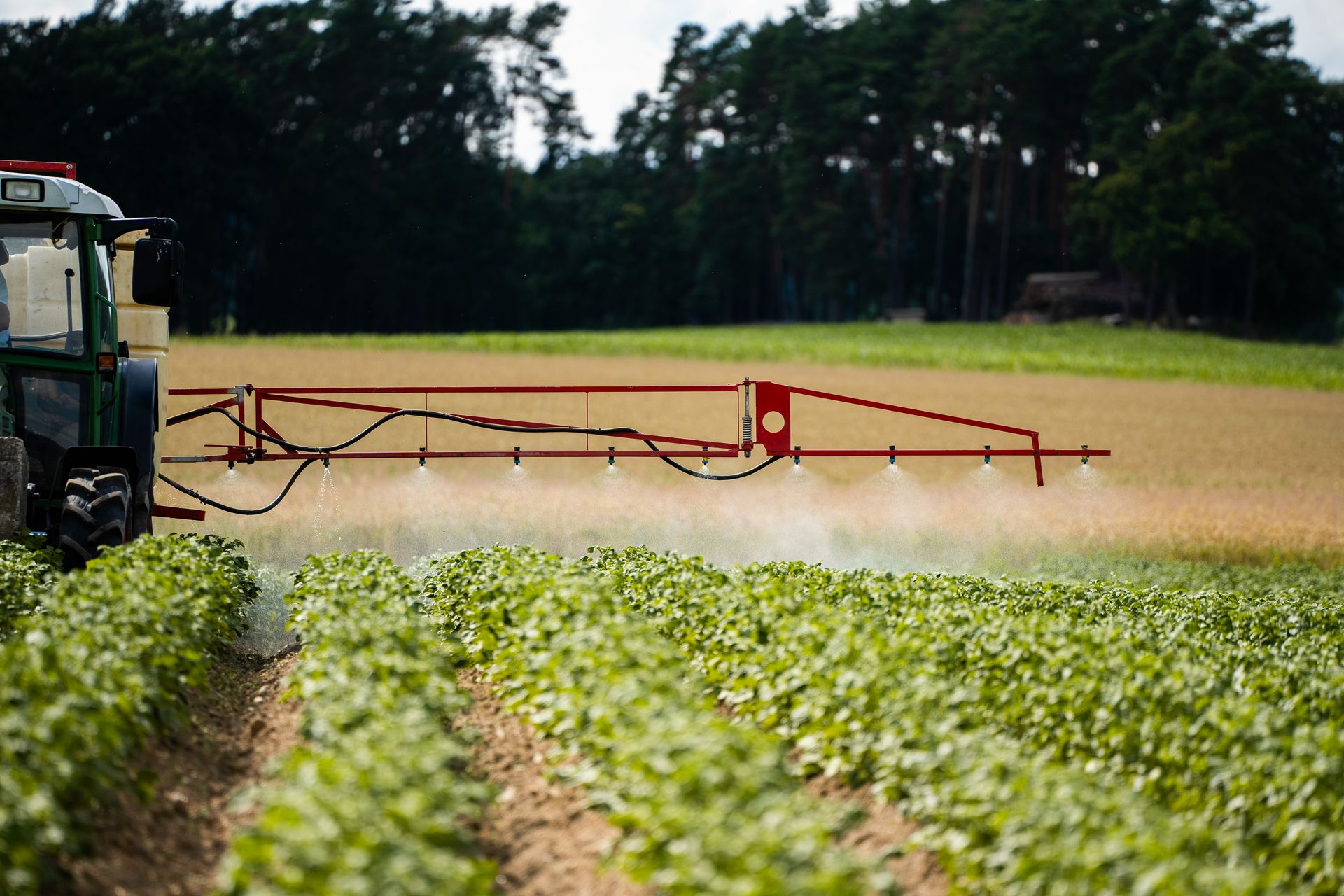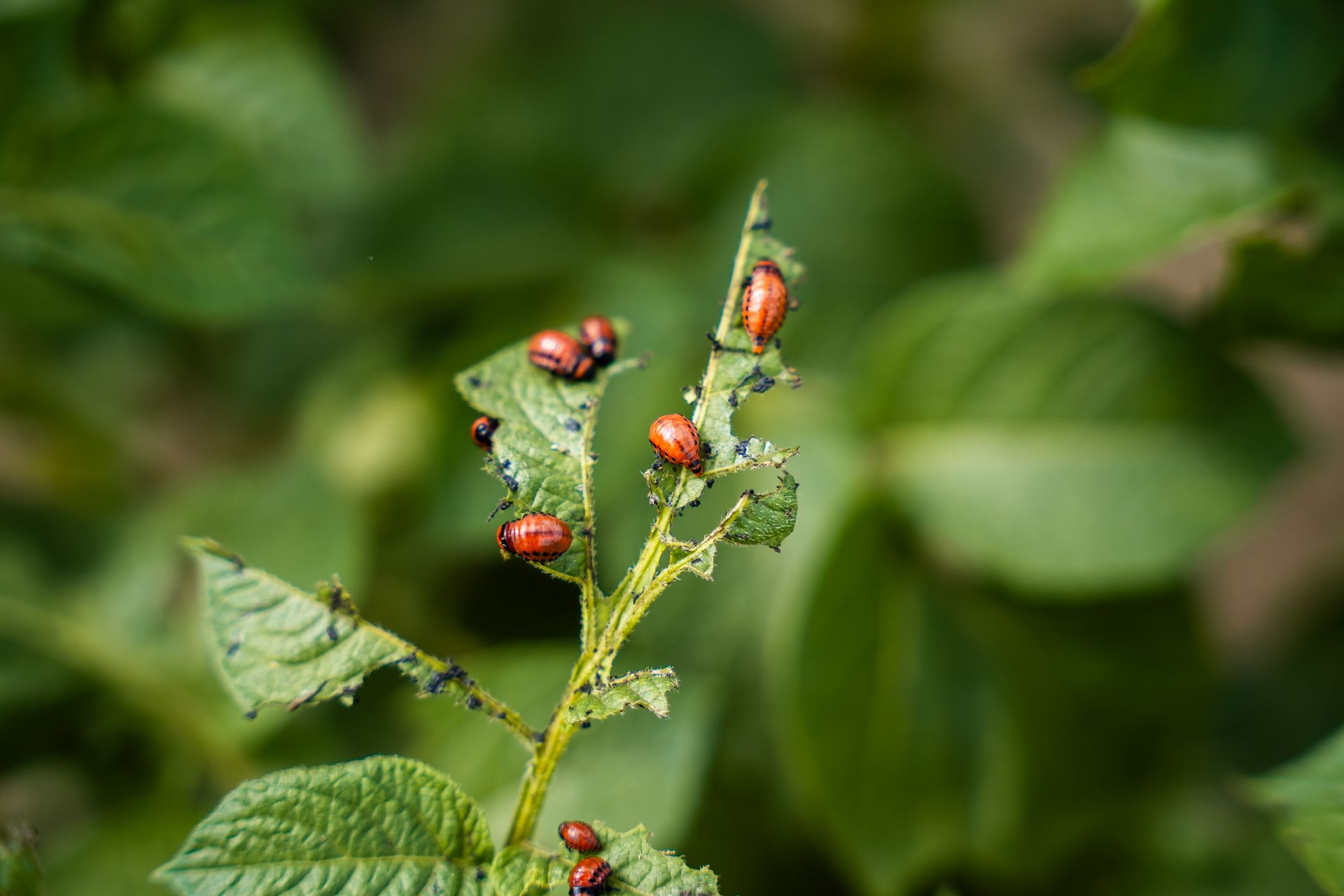In 2023, we experienced a heavy infestation of Colorado potato beetles due to the warm weather, with up to three generations from June to September. The growing resistance of pests to commercially available pesticides is an increasing challenge. With its natural active ingredient azadirachtin, Lithos Aza offers an outstanding alternative that avoids the resistance problem and at the same time ensures environmentally friendly control.
Sucking insects lead to large areas of damage
The occurrence of sucking insects in agricultural and vegetable crops is no coincidence. These pests thrive particularly well in mild climatic conditions. A disturbed plant metabolism can also favour their proliferation. If we understand the key factors, we can develop effective strategies to minimise their occurrence and protect the plants.
Favouring factors for sucking insects
Plant stress
- Drought stress increases susceptibility, as stressed plants produce richer sap.
- Mechanical damage offers pests additional points of attack.
Agricultural practices
- Excessive use of nitrogen fertilisers makes plants more attractive to insects.
- Lack of crop rotation supports permanent insect populations.
Lack of natural predators and biodiversity
- The lack of predatory insects and birds allows pests to grow unchecked.
- Frequent pesticide use reduces beneficial insects and promotes the occurrence of resilience.
Climatic conditions
- Warm and dry weather accelerates the development of insects such as aphids.
- Mild winters promote survival and early activity in spring.
Effective control of Colorado potato beetles, aphids and other insect pests
Colorado potato beetle (in potato cultivation)
The Colorado potato beetle (Leptinotarsa decemlineata) is characterised by its striking yellow-orange appearance with typical longitudinal stripes on its wings. Females of this beetle lay up to 800 eggs on the underside of the leaves. The larvae go through four stages of development before pupating in the soil.
Occurrence and favouring factors:
- Climate: Warm temperatures accelerate development.
- Agriculture: Monocultures of potatoes offer ideal conditions.
- Plant stress: Stressed plants are more susceptible to infestation.
- Pesticide resistance: Rapid development of resistance to insecticides.
Aphid (in tomato cultivation)
The aphid (Aphididae), typically 1-3 mm long, has a soft, often translucent body in green, yellow or black. It feeds mainly on plant sap. Larvae also hatch from unfertilised eggs, which rapidly increases their populations.
Occurrence and favouring factors:
- Climate: Warm and mild conditions promote reproduction.
- High nitrogen content: Promotes soft plant tissue that is easy to penetrate.
- Monocultures: Allow unhindered spread.
- Plant stress: Drought stress makes plants more attractive to aphids.
Thrips (in tomato cultivation)
Thrips (Thysanoptera) are slender insects with characteristically fringed wings. They feed by scraping off plant cells and sucking out their contents. They reproduce quickly, especially under warm conditions, which leads to rapid population increases.
Occurrence and favouring factors:
- Climate: Warm, dry conditions accelerate development.
- Plant stress: Young, soft plant parts are particularly susceptible.
- Lack of natural enemies: Lack of predatory insects favours populations.
Whitefly (in tomato cultivation)
The whitefly (Aleyrodidae), about 1-3 mm long, is a small, flying insect with waxy, white wings. It feeds by sucking on the underside of the leaves, which severely weakens the plants. It also produces several generations per year.
Occurrence and favouring factors:
- Climate: Warm temperatures and high humidity promote growth.
- Plant stress: Stressed plants are more attractive to whiteflies.
- Chemical control: Inappropriate use of insecticides reduces beneficial insects and promotes resistance.
Where preventive measures such as the promotion of beneficial insects, an adapted irrigation and fertilisation strategy and very strict field hygiene are ineffective, Lithos Aza offers the solution for natural pest control in agriculture.
How does Lithos Aza work as a natural pesticide, e.g. against Colorado potato beetles?
Azadirachtin, a natural active ingredient from neem oil, is central to biological pest control and offers an environmentally friendly alternative to conventional insecticides. Its effect reduces the production of ecdysone, the essential moulting hormone of larvae, which disrupts metamorphosis and blocks the development of adult insects.
Azadirachtin also affects reproductive functions and reduces insect feeding as an antifeedant. The many cellular and molecular targets make azadirachtin versatile and effective without jeopardising the environment or biodiversity.
Die Anwendung von Aza
Lithos Aza ist ein effektives, natürliches Pflanzenschutzmittel. Es wird vorrangig eingesetzt, als Spritzmittel gegen Kartoffelkäfer und Schädlinge wie Blattläuse, Weiße Fliegen und Thripse.
Lithos Aza is an effective, natural plant protection product. It is used as a spray against Colorado potato beetles and pests such as aphids, whiteflies and thrips.

Application recommendations for optimum effect
Potato cultivation against Colorado potato beetle:
- Application rate: 2.5 l/ha
- Water quantity: 500 - 1000 litres of water per hectare
- Time: From the start of infestation or at the first symptoms
- max. 1 application
Tomato cultivation against aphids (outdoors):
- Application rate: 3 l/ha
- Water quantity: 750 - 1000 litres of water per hectare
- Timing: From the start of infestation, maximum two applications at intervals of 7 days
Tomato cultivation against whiteflies and thrips (outdoors):
- Application rate: 3 l/ha
- Water quantity: 700 - 1500 litres of water per hectare
- Timing: From the start of infestation, maximum two applications at intervals of 7 days
Extinguish when there's a fire.
Sounds logical, doesn't it? Plant protection in organic farming is particularly demanding. Even in conventional potato and vegetable cultivation, it is often too late to react after an infestation. Lithos Aza offers an effective measure, especially in view of the increasing challenges posed by climate change and the growing resilience of pests.
Rely on Lithos Aza and feel good about making your agriculture naturally resilient and ready for the future. Protect your crops with Lithos Aza, the natural crop protection product.
Would you like more information about the product?
Jetzt mehr erfahren!
NOTE:
Lithos® Aza, Insecticide, Austrian Reg. Nr.:
4487-0
Use plant protection products (insecticide) with care. Always read the label and product information before use.
